Our clinical curriculum exposes residents to a wide array of patient complaints and conditions in multiple training environments. Patient safety is always at the forefront, with appropriate supervision by outstanding faculty. Residents gain graduated responsibility and autonomy over the course of training.
We serve a socioeconomically, racially, and medically diverse population, with common emergency conditions from myocardial infarction to trauma and stroke. Duke is both the local emergency department and a quaternary care center, providing cutting-edge, world-class care. Durham County is home to over 270,000 people, with approximately 42 percent white, 38 percent Black, 13 percent Hispanic or Latino, and 5 percent Asian. Duke University Hospital serves patients from the local community, as well as patients from surrounding states and throughout the country and world.
Our additional training sites, Duke Regional Hospital and the Durham Veterans Administration Medical Center, further diversify our residents' exposure to different health delivery systems and patient populations.
Orientation (Duke University Hospital, 2 weeks)
Our Duke Emergency Medicine experience begins with a dedicated week-long orientation with an intensive focus on acclimating to a new emergency department (ED), common ED patient presentations, and procedural competency. During the first 2 weeks of training, all residents rotate in the Duke University Hospital ED. Every Wednesday in the month of July, PGY1s receive weekly intern-focused didactic and simulation education sessions known as Intern Bootcamp.
Emergency Medicine (Duke University Hospital, 21 weeks total)
Residents see a diverse population of patients, with conditions covering the spectrum of Emergency Medicine, including stroke, myocardial infarction, appendicitis, biliary and renal colic, asthma, psychiatric conditions, toxic exposures, and orthopedic injuries. Residents also see patients with complex care needs, including organ transplant and ventricular assist devices. Residents learn multidisciplinary team-based care, working closely with attending physicians, senior Emergency Medicine residents, physician assistants, nurses, ED pharmacists, social workers, and consultants from other specialties. Duke is a Level 1 Trauma Center and a stroke center and has an active cardiac catheterization lab.
Community Emergency Medicine (Durham Veterans Administration Medical Center, 4 weeks)
During the PGY1 year, Duke EM residents spend 4 weeks right across the street at the Durham VA Emergency Department. There, they get the opportunity to serve our veterans and learn the art and science of EM with different faculty (some of whom are Duke EM alumni!). This exposure to a particular patient population proves quite valuable during the initial year of training.
Resuscitation (Duke University Hospital, 4 weeks)
PGY1 residents spend 2 two-week blocks paired as a team with a PGY3 resident to manage the most critical patients in our 4 resuscitation bays. Under the safe guidance of the senior resident and attending physician, PGY1s gain experience in the management of stroke, trauma, cardiac arrest, overdose, sepsis, and more, as well as developing crucial procedural skills.
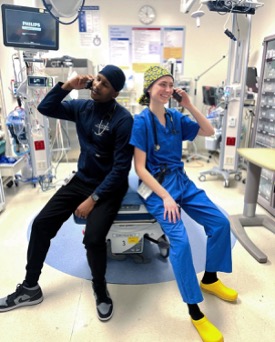
Pediatric Emergency Medicine (Duke University Hospital, 4 weeks total)
PGY1 residents spend two, two-week blocks distributed throughout their first year learning the management of common pediatric emergencies. Our outstanding faculty include specialists with fellowship training in Pediatric Emergency Medicine and board-certified emergency physicians who have committed at least one-third of their clinical practice to emergency pediatrics.
With Duke Children’s Hospital serving as a regional hub for many pediatric specialties, Duke Emergency Medicine residents gain longitudinal exposure to a variety of complex pediatric patients, in addition to more common emergency conditions.
After completing their initial 2-week block, residents continue longitudinal pediatric EM exposure via pediatric ED shifts scattered throughout the year.
Cardiac Intensive Care Unit (Duke University Hospital, 4 weeks)
PGY1 residents spend four weeks in the Cardiac Intensive Care Unit at Duke University Hospital, managing patients with a wide variety of cardiac pathology such as ST-segment elevation myocardial infarction, severe heart failure, brady and tachydysrhythmias, pericardial tamponade, myocarditis, and cardiogenic shock. Patient safety and resident education are supported by Duke’s world-class cardiology faculty.
Airway/Ultrasound (Duke University Hospital, 4 weeks total)
Our PGY-1 residents complete two 2-week blocks in airway and ultrasound, one scheduled in each half of the year, guaranteeing early and ongoing exposure to these critical emergency medicine skills.
PGY1s learn core principles of airway management under the tutelage of Duke’s outstanding anesthesia faculty, with morning sessions in the operating rooms. This includes experience with bag-valve-mask ventilation, endotracheal intubation, fiberoptic intubation, and laryngeal mask airway techniques.
Afternoons are spent in the Emergency Department at Duke University Hospital, developing point-of-care ultrasound skills under the guidance of emergency medicine faculty, ultrasound fellows, and senior emergency medicine residents. Resident training is also enhanced with online educational resources, high-fidelity simulation, and weekly quality assurance sessions in which residents review images with our fellowship-trained ultrasound faculty. Residents complete over 100 ultrasound scans during the rotation, already approaching the ACGME requirements in their first year of training alone.
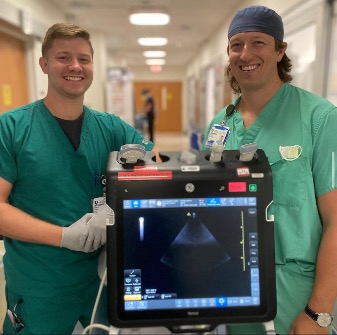
Obstetrics and Gynecology (Duke University Hospital, 4 weeks)
Residents spend 4 weeks on the Labor and Delivery floor, working side-by-side with our OBGYN residents to learn assessment and management of obstetric and gynecologic emergencies, complications of pregnancy, and treatment of various medical conditions in pregnant patients. During the rotation, residents assist in vaginal deliveries under supervision of OBGYN attendings.
Hospital Medicine (Duke University Hospital, 3 weeks)
During this 3-week rotation, residents care for patients on the general medicine service under the supervision of Duke’s world-class hospitalists. Residents gain exposure to a broad spectrum of pathology, interdisciplinary care, and full scope of care from admission to discharge.
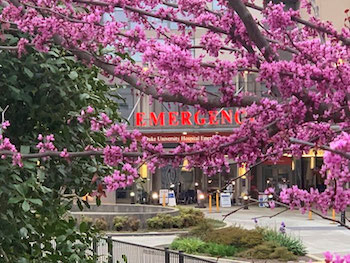
Emergency Medicine (Duke University Hospital, 22 weeks)
PGY2 residents take on new leadership challenges, leading their patient care teams in medical and trauma resuscitations in the Emergency Department. Responsibilities include airway management in level 1 trauma patients, responding to EMS calls as the medical control physician, teaching junior residents and medical students, and developing their understanding of Emergency Department efficiency and flow.
Community Emergency Medicine (Duke Regional Hospital, 4 weeks total)
PGY2 residents gain new insights into care delivery in this busy community affiliate hospital. Residents care for medical, surgical, and trauma patients, supervised by Emergency Medicine faculty. Resident autonomy and education are emphasized, as residents directly deliver care and interact with faculty consultants. Residents develop perspectives on community career paths in Emergency Medicine. The Emergency Medicine faculty group at Duke Regional Hospital is distinct from those at Duke University Hospital, providing valuable alternative clinical approaches. The rotation is distributed in two, two-week blocks over the first and second halves of the second year of training.
Pediatric Emergency Medicine (Duke University Hospital, 4 weeks total)
PGY2 residents serve as senior leaders in the Pediatric Emergency Department, leading pediatric medical and trauma resuscitations under the safe guidance of our Pediatric Emergency Medicine specialists. Residents gain new experience with pediatric sedation and management of critically ill pediatric patients.
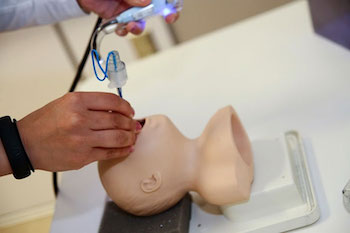
Medical Intensive Care Unit (Duke University Hospital, 4 weeks)
PGY2 Emergency Medicine residents are integrated team members on the team, evaluating ICU consults in the Emergency Department and managing their care in the ICU under the supervision of Critical Care faculty and fellows. Residents gain experience in a wide array of crucial skills and management of life-threatening conditions. Training focuses on pulmonary physiology and ventilator management, vasopressors and invasive monitoring, shock recognition and management, and more. Common conditions residents care for in the ICU include sepsis and septic shock, massive pulmonary embolism, and respiratory failure.
Pediatric Intensive Care Unit (Duke University Hospital, 4 weeks)
PGY2 residents learn side-by-side with Pediatrics residents and Pediatric Critical Care fellows as they care for critically ill pediatric patients under supervision of Pediatric Critical Care faculty. Residents are exposed to core principles such as pediatric specific physiology and pharmacology as they care for diverse conditions, including status epilepticus, DKA, asthma, sepsis, and congenital disorders.
Surgical Intensive Care Unit (Durham Veterans Administration Medical Center, 4 weeks)
Residents gain experience with post-operative complications and management of diverse conditions. Vasopressors, chest tube management, and ventilator use are some of the many skills residents develop during the rotation. On this rotation, ED residents serve as the airway resident for all codes throughout the hospital.
ED Orthopedics (Duke University Hospital, 2 weeks)
Our PGY-2 orthopedics resident assists in the care of all orthopedic injuries in the emergency department including reductions, splinting, and nerve blocks. Residents also spend an afternoon at Lennox Baker Children’s hospital obtaining hands-on practice with splinting and casting.
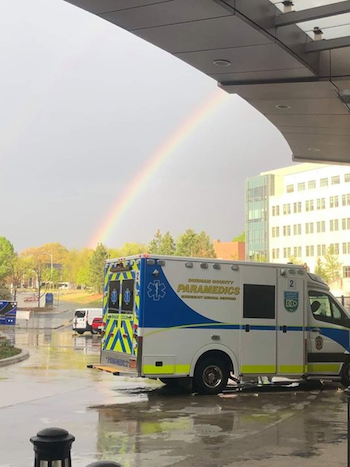
Emergency Medical Services (Durham EMS, 2 weeks)
Residents work closely with our EMS leadership to understand the role of EMS in the medical system, as well as the capabilities and limitations of diagnosis and treatment in the prehospital environment. Residents develop medical control skills by serving as hospital medical control during their shifts and on-scene medical control during their EMS rotation through ride-alongs with Durham County and Wake County EMS. They are also able to gain a fuller understanding of the prehospital system through ride-alongs with the City of Durham Fire Department, interactive experiences with the Durham Emergency Call Center, and participation in Quality Management meetings. Residents also participate in the education and training of our prehospital colleagues through teaching during continuing education sessions or simulations. Duke Emergency Medicine also has strong partnerships with EMS physicians and agencies in Eswatini, Singapore and Brazil, providing unique opportunities for global EMS research and collaboration.
Emergency Medicine (Duke University Hospital, 26 weeks)
As the senior resident leaders in the Emergency Department, PGY3s direct resuscitations of medical and trauma patients, perform advanced resuscitative procedures, respond to out-of-ED codes, provide EMS medical control, direct department flow, and teach junior residents and medical students.
Resuscitation (Duke University Hospital, 4 weeks total)
PGY3 residents spend 4 weeks (2 two-week blocks) paired as a team with a PGY1 resident to manage the most critical patients in the Emergency Department. Senior residents develop autonomy and team leadership skills, guiding the resuscitation of critically ill patients with stroke, trauma, cardiac arrest, overdose, sepsis, and more. PGY3s develop advanced procedural skills, including transvenous pacemaker placement and endoscopic airway techniques. Patient safety is at the center, with immediate availability of board-certified Emergency Medicine faculty. PGY3s also advance as educators, teaching PGY1s about critical care.
Pediatric Emergency Medicine (Duke University Hospital, 8 weeks total)
PGY3 residents are leaders in the Pediatric Emergency Department, directing pediatric resuscitations, performing advanced procedures, and educating junior learners all while advancing their own education under the guidance of our specially trained Pediatric Emergency Medicine faculty. PEM shifts are scheduled in 2-week blocks throughout the year.
LifeFlight/Administration (2 weeks)
Residents work alongside Duke LifeFlight to provide event medicine coverage at Duke Football and Basketball games, respond to in-hospital emergencies, participate in critical care ground and air transport, and so much more! On their administration block, residents learn about the operational mechanics of an Emergency Department, from ensuring quality patient care to providing adequate staffing. Outside of this rotation, residents continue longitudinal experiences with administration, serving on quality committees and developing safety projects in the Emergency Department and throughout the Hospital.

Elective (4 weeks)
Elective time allows residents to introspectively identify areas for their own growth and development. Residents choose from a wide variety of specialized training opportunities at Duke, from critical care to radiology and point of care ultrasound. For residents with a global health focus, the residency provides a competitive internal research grant opportunity allowing travel to our research and training site in Tanzania.
